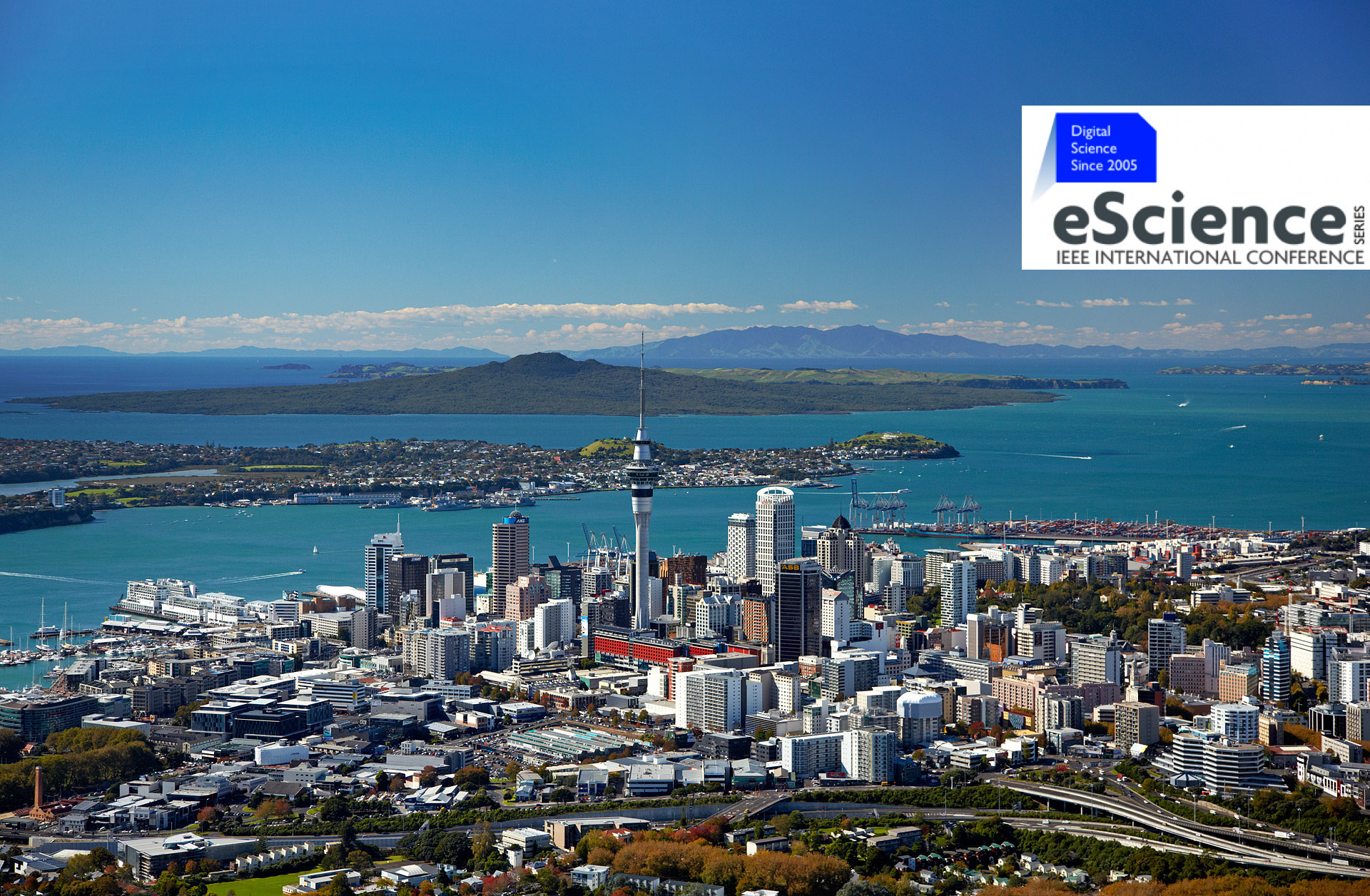eScience 2017 announces five workshops confirmed for the coming meeting, 24 – 27 October in Auckland, New Zealand. Workshops will be held on the first day, 24 October, followed by three days’ discussion with leading international and interdisciplinary research communities, developers, and users of eScience applications and enabling IT technologies. Research itself is undergoing a series of radical changes driven by a digital revolution, and this conference is the premier international forum to share the results of the latest research and product developments.
Conference Workshops Chair Dr Kyle Chard is pleased to announce a full workshop programme of five workshops. These represent a mix of ongoing and new areas of development, including several new workshops: WoWS 2017 exploring high performance workflows which operate across distributed infrastructure comprising of computers, storage, instruments and multi-gigabit networks; BigDig explores how to advance the technology of high-throughput specimen digitization and ingest to match the requirements to digitise ~1.5 billion specimens, distributed across 1000+ collections, in the next 30 years or more; and Safe Data: Paradigms & Platforms recognises the compute infrastructure and the ‘data science’ tools, techniques, and methods required to truly capitalise on the deluge of high quality but sensitive data are, sadly, only available to an elite few researchers.
These join established communities: WSSSPE5.2 discusses practices and experiences in sustainable scientific software, with the goal of improving the quality of today’s research software and the experiences of its developers by sharing practices and experiences; ECW covers a topic of acute interest due to societal challenges, technical developments and new policy frameworks that require more general, productised and mature approaches for state-of-the-art environmental modelling solutions for managing disasters and disaster risks.
Dr Michelle Barker from Australia’s National eResearch Collaboration Tools and Resources (Nectar) is one of the organisers of the WSSSPE5.2 workshop. WSSSPE is an international community-driven organisation that promotes sustainable research software by addressing challenges related to the full lifecycle of research software through shared learning and community action.
“I’m very excited that WSSSPE is being held in the southern hemisphere for the first time,” said Dr Barker, “WSSSPE has a very strong focus on creating community, and our workshop at IEEE eScience provides a fantastic opportunity to facilitate regional community discussions focused on sustainable research software, by sharing and building best practice both locally and internationally. Creation of sustainable research software is a topic of interest to many IEEE eScience attendees, so we are delighted to be able to run a WSSSPE event in Auckland.”
Workshop organiser Dr Mark Hereld, from Argonne National Laboratory and the University of Chicago, is hosting the BigDig workshop. BigDig aims to bring together leading experts in the technologies, practice, and requirements for high throughput digitisation of the world’s scientific collections. Dr Hereld hopes that the workshop will catalyse new and important ideas that will enable significant progress on the challenging problem of translating large collections of physical specimens into the digital realm where they may contribute to a new understanding of biodiversity and natural history. Bringing this conversation about large scale digitisation and scientific exploration of virtual collections into the larger eScience community seems an excellent match. He and his international colleagues are looking forward to the opportunity to participate in this excellent conference.
Conference co-chair Nick Jones welcomes the richness of these contributions to this year’s event. “These workshops show the state of the art in eScience technology developments, pulled together by researchers and practitioners driving evolution of digital research across the globe. It will be a privilege to host such a diverse group, and to explore with them the future of digital technologies wielded to address our most challenging questions on society, environment, economy.”
The following workshops are confirmed for eScience 2017:
WSSSPE5.2: Workshop on Sustainable Software for Science: Practice and Experiences - Michelle Barker, Nectar (Australia)
- Brian Corrie, NeSI (NZ)
- Sandra Gesing, University of Notre Dame (USA)
- Daniel S. Katz, University of Illinois Urbana-Champaign (USA)
- Steven Manos, University of Melbourne (Australia)
- Aleksandra Pawlik, NeSI (NZ)
- Colin C. Venters, University of Huddersfield (UK)
ECW: Environmental Computing Workshop - Dieter Kranzlmüller, LMU & LRZ Munich (Germany)
- Matti Heikkurinen, LMU Munich (Germany)
- Jens Weismüller, LRZ Munich (Germany)
Safe Data: Paradigms & Platforms: enabling collaborative analysis of sensitive data - Eamon Duede, University of Chicago (USA)
- Ian Foster, University of Chicago (USA)
- Julia Lane, New York University (USA)
BigDig: High-Throughput Digitization for Natural History Collections - Mark Hereld, Argonne National Laboratory (USA)
- Petra Sierwald, The Field Museum of Natural History (USA)
- Nicola Ferrier, Argonne National Laboratory (USA)
WoWS 2017: First International Workshop on Workflow Science - Ilkay Altintas, San Diego Supercomputer Center, UC San Diego (USA)
- Raj Kettimuthu, Argonne National Laboratory and The University of Chicago (USA)
- Craig E. Tull, Lawrence Berkeley National Laboratory (USA)
|






